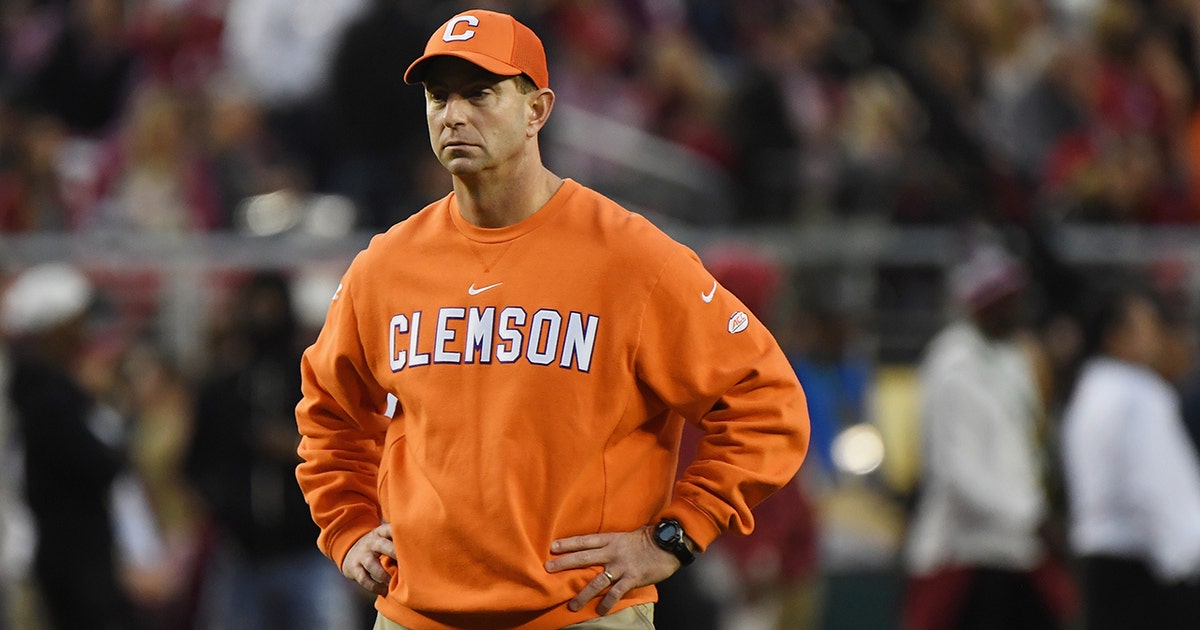How We Got Here: The Dabo Swinney controversy


Over the past week, Clemson Tigers coach Dabo Swinney has faced increasing backlash regarding several recent incidents, including his choice of wardrobe from this past weekend and, earlier last week, the revelation that one of his assistant coaches used a racial slur in an interaction with a black Clemson football player in 2017.
Since the death of George Floyd on May 25 – an unarmed black man who died in police custody in Minneapolis, Minnesota – protests and demonstrations have swept the nation, bringing to light racial injustices that still exist in the United States and further popularizing the phrase “Black Lives Matter.”
In fact, on June 4, a host of black NFL superstars released a powerful video, imploring the league to support the Black Lives Matter movement.
#StrongerTogether pic.twitter.com/sfwF9Uvgaa
— Patrick Mahomes II (@PatrickMahomes) June 5, 2020
NFL Commissioner Roger Goodell responded a day later.
“We, the NFL, believe Black Lives Matter.”
We, the NFL, condemn racism and the systematic oppression of Black People. We, the NFL, admit we were wrong for not listening to NFL players earlier and encourage all to speak out and peacefully protest. We, the NFL, believe Black Lives Matter. #InspireChange pic.twitter.com/ENWQP8A0sv
— NFL (@NFL) June 5, 2020
As the Black Lives Matter movement continues to gain steam, many on social media and beyond were disappointed when on June 6, a photo emerged of Swinney wearing a “Football Matters” t-shirt, which some regarded as an offensive play on words.
Dabo Wore A “Football Matters” Shirt Yesterday, Some Are Not Happy With That Decisionhttps://t.co/pfhbFA8J2s pic.twitter.com/nopVeofCfH
— Barstool Sports (@barstoolsports) June 7, 2020
In response to the criticism, Swinney said in a statement on June 8 that he’s been wearing the shirt for years.
“It’s a shirt I’ve had for a couple years. It’s given to pretty much every coach by the National Football foundation … That’s been their promotional thing, I think, since all the way back in 2014. And I would just say any insinuation that I was trying to mock the Black Lives Matter movement, it is just an attack on my character … and really sad. But I also will say, I wholeheartedly support Black Lives Matter. In fact, I don’t quite think that’s adequate enough – I think black lives significantly and equally matter … God loves us all. None of us are better than anybody else. It doesn’t matter what the color of our skin is.”
Clemson superstar quarterback Trevor Lawrence was quick to come to the defense of his coach.
Coach Swinney’s shirt, in any way, is not mocking the Black Lives Matter movement. He has been wearing the shirt for months in meetings.
— Trevor Lawrence (@Trevorlawrencee) June 7, 2020
Swinney has long served as a pillar in the South Carolina community via the Clemson football program, which might explain why Lawrence jumped into the fray in order to defend him, as did Miami Dolphins defensive end Shaq Lawson.
Naw I never said Dabo . Dabo love me like one of his son.
— Shaq Lawson (@Shaq_Lawson90) June 3, 2020
Current Clemson basketball standout and Third-Team All-ACC selection Aamir Simms also came to the defense of Swinney.
Y’all get off Dabo man? at this point y’all just trying to fill headlines and that’s sad
— Aamir Simms (@EarlShmitty_) June 7, 2020
And several other current and former players have taken to social media to weigh in on Swinney’s leadership and role in their lives.
In the short amount of time I’ve been here Coach Swinney has taught me many life lessons and cared for us all like his own❤️ I wouldn’t want to be coached by any other person‼️ He and his wife have some of the best hearts on this Earth.. https://t.co/zZC2p8kS56
— Sergio Allen (@Sallen45_) June 8, 2020
My coach is not the type of person that the media is portraying him to be, he is a great man/coach that cares about each and everyone of us and i know for a fact that everyone apart of this program can vouch for him in a very confident way ! #ALLIN
— KevinSwint (@kevinswint1) June 8, 2020
No grey area wit me this is MY HEAD COACH. Honored to this day to be playing for this man his faith and genuine love for his players as PEOPLE first is so rare in this profession. Love ya lil man ‼️?✊? https://t.co/WCGKHCGXL7
— KJ Henry (@thekjhenry) June 9, 2020
Lastly, former NFL defensive end Miguel Chavis, now a coach at Clemson, shared how Swinney transformed his life after high school.
(1/4) There once was a multi-racial kid raised by a single mother of 5 who had a lot of God-given talents, but was more lost than an Easter egg. He tried to fight his coach during a game his JR year. He had to go to prep school to qualify. He moved 10 times before he turned 18.
— Coach Miguel Chavis (@MiguelChavis65) June 6, 2020
(2/4) Dabo Swinney went into his living room and made a promise to his mom, best friend’s mom and big sister. He promised to always love that boy and develop him into a good man. He promised that boy would would graduate and gain tools In life to one day be a good dad, husband,
— Coach Miguel Chavis (@MiguelChavis65) June 6, 2020
(3/4)…and neighbor to all people… that boy is ME!!!!! I fell in love with Jesus, met my wife and got my bachelor’s degree at Clemson University, under the LOVE and CARE of Coach. I now have 4 beautiful multiracial kids, own 3 houses, invest in my players’ lives
— Coach Miguel Chavis (@MiguelChavis65) June 6, 2020
(4/4)…and the lives of college students in my community…Coach. Kept. Every. Single. Promise…and he’s STILL doing it today! LIKE and RETWEET so we can tell the WHOLE truth. #ThankYouCoachSwinney
— Coach Miguel Chavis (@MiguelChavis65) June 6, 2020
Clearly, Swinney is beloved by those in the Clemson football program and beyond, which further complicates his apparent tone-deafness in wearing the “Football Matters” t-shirt over the weekend.
Skip Bayless and others maintain that Swinney wearing the t-shirt was offensive to the black community, especially in today’s racial climate.
“You can’t do it. There’s nothing clever about that … For the first time ever, a lot of people’s ears and eyes have been opened to this cause, except Dabo’s. You would dare to wear that shirt? It really speaks volumes about you. It’s the truth of what you believe. In your world, all that really matters is football.”
“How is Dabo getting away with wearing that t-shirt, ‘Football Matters’, at this time? It’s a slap in the face of every black man and woman in this country. You know it and I know it.”@RealSkipBayless pic.twitter.com/zWMJ7PBfd4
— UNDISPUTED (@undisputed) June 9, 2020
As of this week, the National Football Foundation has decided to abandon its ‘Football Matters’ initiative, posting this message on their website.
In no way was it the intention of the National Football Foundation to imply that football is more important than a black life or any life. We fully support the peaceful protests and the mission of these protests to end racism, social injustice and social inequality. Therefore, we will change the name of the Football Matters campaign. This work is underway, and we will have a new campaign name for the 2020-21 season and beyond.
For Swinney, the t-shirt incident comes on the heels of another controversy that gripped his program early last week.
On June 1, Swinney released a statement via the Clemson Football Twitter account, addressing the protests that have swept the nation in response to the death of Floyd.
“We are all hurting for the Floyd family and our country. I can speak for our entire staff and our team in that regard. We have all witnessed disgusting acts of evil – that’s really the only word I can appropriately use – over the past week here and beyond. To address it for me, everything for me goes back to my faith. That’s where I draw my peace from, that’s where I draw my hope from … What I know, as I approach everything from a perspective of faith, is that where there are people, there’s gonna be hate, there’s gonna be racism and greed and jealousy and crime and so on, because we live in a sinful, fallen world. We’ve had so much bad news … but really today, I just wanted to take a moment and offer some good news. For me, the good news is we have a Lord that loves us all … Love doesn’t see color – hate does.”
— Clemson Football (@ClemsonFB) June 1, 2020
However, a day later, a story leaked on social media claiming that one of Swinney’s assistant coaches, Danny Pearman, used the n-word in an interaction with former Clemson tight end DJ Greenlee back in 2017.
Matt Connolly of The State – a South Carolina-based newspaper – reached out to Greenlee on June 2 to clarify the details of the Pearman incident. According to Greenlee, Pearman – a white man – didn’t directly call him the n-word, but instead used the slur after overhearing Greenlee – a black man – use it in discussion with Milan Richard, another former Clemson tight end who is also black.
“(Milan) was asking me what happened? ‘What’s coach getting on to you about?’” Greenlee recalled. “I was just like, ‘Man I got the (n-word) that came in my gap.’ I was talking to my teammate. That was all that was said. Then the next thing you know coach Pearman starts coming over there. He was repeating what I just said. He’s like, ‘(n-word) this, (n-word) that. The (n-word) wasn’t there.’”
News: Former Clemson player tells The State about n-word incident with Tigers assistant coach https://t.co/VRw8gsku8L
— Matt Connolly (@MattatTheState) June 2, 2020
Greenlee told Connolly that with the heightened discussion on racism across the country, he felt it was important to speak up on this specific experience once it became public and that his former teammates have been appreciative of his candor.
“All my teammates that know what’s going on, the reason they’re hitting me up is, they’re like, ‘Man, for you to have to come out and say that because we know what you actually dealt with, it takes a real man to deal with that.’ ”
NEW: “I’m not gonna sit there and lie… especially during this time.”
Why D.J. Greenlee spoke about the n word incident and his thoughts on if Danny Pearman should be punished https://t.co/A3TUfrF2mA
— Matt Connolly (@MattatTheState) June 3, 2020
Greenlee said Pearman – who is still coaching at Clemson – apologized to him privately after the incident and throughout the 2017 season, and that Swinney decided to handle the matter privately between the three of them and not address it with the team.
Last week, after the incident came to light, Pearman released a statement, publicly apologizing for his use of the racial slur.
“Three years ago on the practice field, I made a grave mistake involving D.J. Greenlee. I repeated a racial slur I overheard when trying to stop the word from being used on the practice field. What I overheard, I had no right to repeat. While I did not direct the term at any player, I know there is no excuse for me using the language in any circumstance. I never should have repeated the phrase. It was wrong when I said it, and it is wrong today.
“I apologized to D.J. at the conclusion of practice, who then appropriately raised his concern to Coach Swinney. Coach and I met to discuss the incident, and he reiterated that my language was unacceptable. I later apologized again as well as expressed my sincere regret to our position group the following day. I love the young men who choose to come to our university, and I would never do anything to intentionally hurt them. I sincerely apologize to D.J., his family, our team and our staff.”
Clemson assistant coach Danny Pearman issued an apology Tuesday night for using a racial slur at practice after the incident was brought up by a former player on social media. https://t.co/IkFtc73zEJ
— USA TODAY Sports (@usatodaysports) June 3, 2020
Today, the question is if Swinney made the right call to handle the matter privately, considering some players overheard the interaction and several got wind of it.
In response to Swinney’s statement on the death of Floyd and racial injustices in America, former Clemson wide receiver Kanyon Tuttle took to Twitter, expressing his belief that his former coach dropped the ball in several areas involving race and impacting change in recent years.
Cap, you allowed a coach to call a player the N-word during practice with no repercussions. Not even a team apology. When we had the sit-in in front of sikes you suggested us players try to stay out of it to limit distractions. Stop protecting your brand, take a stand https://t.co/7gznXmyniI
— Tut (@_kinggtutt) June 2, 2020
Don’t think I don’t respect Coach Swinney, he is not a terrible person by any means. But he needs to do better than this. All the black athletes that helped you get where you are, you can do better to show them you really have their best interest at heart
— Tut (@_kinggtutt) June 2, 2020
ESPN’s Bomani Jones also took exception with Swinney’s statement, saying that he did a disservice to himself and his players by not addressing the Pearman incident with the team, and that Swinney missed the mark by suggesting the black community should focus on forgiveness during this difficult time.
“What jumps out from accounts of the incident and its aftermath is that Pearman … did not apologize to the whole team. It is clear that Clemson’s players – not just the tight ends – were affected by the incident. Swinney demands accountability from his players, but where is it when a coach does something to those players? … He could only speak about today’s unrest in terms of faith. He is either unwilling or incapable of considering race.”
“if [dabo swinney] can’t even deal with [race] on his team, if his only answer for black pain is to forgive, he’s doing damage to his players and a disservice to himself.”
i did a parting shot for @otlonespn. pic.twitter.com/010A1hpkUS— bomani (@bomani_jones) June 6, 2020
In response to the criticism he received, Swinney released a video message on June 8. In addition to addressing the “FOOTBALL MATTERS” t-shirt, he directly addressed the Pearman incident.
Swinney said that Pearman did not explicitly call Greenlee the n-word and that the matter was best handled in private.
“I would fire a coach immediately if he called a player the n-word. That absolutely did not happen … Things happen. There’s a lot of things that I don’t allow in our program. But when things happen, we deal with it. Sometimes it’s in private, sometimes it’s public. This particular case, the player came to me in private, and we had handled in private. And I think it’s important to know, because every case is different. But this particular player, DJ, I’ve known him his entire life. Coach Pearman’s known him his entire life. But he brought this to me in private. He told me what happened. Met Coach Pearman, he was profusely apologetic.”
A message from Coach Swinney
— Clemson Football (@ClemsonFB) June 8, 2020
Still, as of Tuesday, the criticism of Swinney hadn’t eased up, and Shannon Sharpe discussed his dissatisfaction with Swinney’s June 8 statement.
“Dabo said, ‘I would fire a coach on the spot if he said [the n-word] to a player.’ Dabo, I’m not patting your ass on the back for doing that. You should! … Dabo, you missed the mark on this one. I thought it was a lot of rambling. I thought it was a lot of kudos to your program, a lot of kudos to you and your coaching staff, but it did not address the issue of what brought you back into this, and that was [what Greenlee said about Pearman using the n-word] and what you’re gonna do to help advance the football.”
“Don’t make it seem like Clemson has bridged the gap on race relations. The problem I have is when it comes to issues like this, Dabo’s just a ball coach. What we need you to understand is that there’s a problem, and football can’t solve it.”@ShannonSharpe pic.twitter.com/g0X4PSMOSw
— UNDISPUTED (@undisputed) June 9, 2020
Stay tuned for more updates.









